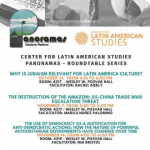Past Events
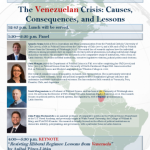
- 4130 Wesley W. Posvar Hall
Schedule:
1:30—3:30 p.m. Panel
Moderator: Scott Morgenstern
Ignacio Arana holds a BA in Journalism and Mass Communication from the Pontifical Catholic University of Chile (2002), a MA in Political Science from the University of Chile (2007), and a MA and a PhD in Political Science from the University of Pittsburgh (2015). His central line of research explores how the individual differences among presidents have an impact on relevant political phenomena, including institutional change and policy outcomes. His secondary line of research is the comparative study of institutions, with a focus on Latin America. He studies informal institutions, executive-legislative relations, judicial politics and elections.
Jana Morgan joined the Department of Political Science in Fall 2005 after completing her PhD (2005) and M.A. (2001) in Political Science from the University of North Carolina at Chapel Hill. Jana received her B.A. in Political Science and Modern Languages from Wheaton College in 1998.
Her research considers issues of inequality, exclusion, and representation. She is particularly interested in exploring how economic, social and political inequalities affect marginalized groups' influence and undermine democratic institutions and outcomes. She has conducted field research in Venezuela, Peru, Ecuador, Chile, and Argentina.
Scott Morgenstern is a Professor of Political Science, and has been at the University of Pittsburgh since 2005. He served as the Director of Pitt's Center for Latin American Studies from 2014-2018. His research focuses on political parties, electoral systems, and legislatures, with a regional specialization in Latin America.
John Polga-Hecimovich is an assistant professor of comparative politics in the Political Science Department at the U.S. Naval Academy, and previously taught at Wake Forest University, the College of William & Mary, and FLACSO-Ecuador. His research is broadly focused on the effects of political institutions on democratic stability, policymaking, and governance, with a particular focus on Latin America.
4:00—5:30 p.m. KEYNOTE
“Resisting Illiberal Regimes: Lessons from Venezuela”
by Anibal Pérez-Liñán
Aníbal Pérez-Liñán is Professor of Political Science and Global Affairs at the University of Notre Dame. His research focuses on democratization, political institutions, executive-legislative relations, and the rule of law in new democracies. He is the author of Presidential Impeachment and the New Political Instability in Latin America (Cambridge University Press, 2007), and Democracies and Dictatorships in Latin America (with Scott Mainwaring, Cambridge University Press, 2013).
Professor Pérez-Liñán is the editor in chief of the Latin American Research Review, the scholarly journal of the Latin American Studies Association (LASA), and co-editor with Paolo Carozza of the Kellogg Series on Democracy and Development at the University of Notre Dame Press. Pérez-Liñán was part of the faculty at the University of Pittsburgh and a member of CLAS between 2001 and 2018.
For more information, email: clas@pitt.edu or visit: www.ucis.pitt.edu/clas
Sponsored by the Center for Latin American Studies, University Center for International Studies at the University of Pittsburgh.

- Trevor Erlacher and Anna-Maria Karnes
- Global Hub (1st Floor of Posvar Hall)
Representative from UCIS and the Study Abroad Office will be providing information on a variety of scholarships, fellowships and tuition remission opportunities that can help you fund study abroad in Africa, Asia, Latin America, Europe, Eurasia and Russia -- as well as tips for exploring, choosing and preparing for a study abroad program that's just right for you.
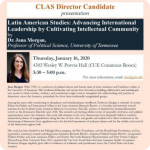
- by Dr. Jana Morgan, Professor of Political Science, University of Tennessee
- 4303 Wesley W. Posvar Hall (CUE Commons Room)
CLAS Director Candidate Presentation: Latin American Studies: Advancing International Leadership by Cultivating Intellectual Community Jana Morgan (PhD, UNC) is a professor of political science and former chair of Latin American and Caribbean studies at the University of Tennessee. Her academic leadership and service have focused on building collaborative and interdisciplinary spaces in which scholars, students, and practitioners might work to strengthen the understanding and practice of democracy across the Americas, particularly for those from traditionally marginalized groups. Among her many roles contributing to disciplinary and interdisciplinary excellence, Professor Morgan is currently Associate Editor for Politics and International Affairs at the Latin American Research Review, is a founder and executive council member for the Southeast Latin American Behavior Consortium (SeLAB), and has co-directed the AmericasBarometer surveys in the Dominican Republic since 2006. Her research and teaching address issues of inequality, exclusion, and political representation across the Americas. Her work calls attention to the ways democracies have frequently failed to confront entrenched patterns of marginalization along the axes of race, class, and gender and analyzes how these weaknesses in the functioning of democracy have significant costs for the lived experiences of ordinary citizens and for the stability and survival of the democratic regime itself. Her work has been funded by the Fulbright-Hays program, the Pew Foundation, and the Russell Sage Foundation, and has appeared in numerous journals including Latin American Research Review, American Political Science Review, Comparative Political Studies, and Latin American Politics and Society. Her book Bankrupt Representation and Party System Collapse (Pennsylvania State University Press 2011) received the Van Cott Award from the Latin American Studies Association. Professor Morgan regularly gives talks to audiences of academics and practitioners across the United States and Latin America. She is currently writing two books, one analyzing how structures and experiences of ethnoracial exclusion shape democratic citizenship across Latin America and another identifying how inequalities in the US interest system stifle policymakers' attention to major economic and social problems. www.ucis.pitt.edu/clas
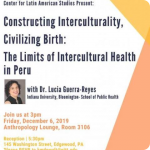
Lecture: Constructing Interculturality, Civilizing Birth: The Limits of Intercultural Health in Peru
- Dr. Lucia Guerra-Reyes Indiana University, Bloomington- School of Public Health
- Anthropology Lounge, Room 3106
This talk analyzes how the practices of care for pregnant and birthing indigenous women in public health clinics exemplify the structural limits to intercultural healthcare in Peru. The intercultural birthing policy was heralded as a major shift in the history of health care in Peru. It changed existing birth protocols, that followed technocratic models of birthing, to incorporate traditional Andean practices of care. The Peruvian deployment of an intercultural health framework echoed political projects in Ecuador and Bolivia which recognized indigenous health practices and preferences as on par with biomedical perspectives. This signaled a willingness to recognize and respect cultural differences and address historically engendered marginalization of indigenous communities. However, the construction of intercultural health through the day-to-day practices of pregnancy, labor and postpartum care of indigenous women demonstrates a clear disconnection between discourse and praxis. Further, they speak to a broader project of forceful “modernization” of indigenous bodies to fit into the desired mestizo nation.
Dr. Lucia Guerra-Reyes is a medical anthropologist and interdisciplinary researcher. She holds a PhD in Anthropology and a Master’s in Public Health (MPH) in Behavioral and Community Health, both from the University of Pittsburgh. Prior to that, she studied a Master’s degree in Gender, Sexuality and Reproductive Health at the Universidad Peruana Cayetano Heredia in Lima, Peru. She is currently an associate professor in the Department of Applied Health Science, at Indiana University Bloomington- School of Public Health. Her research focuses on the complexities of access to sexual and reproductive health care for marginalized communities. She is the author of “Changing birth in the Andes: Culture, Policy and Safe Motherhood in Peru” (Vanderbilt 2019).
For any questions, email LCA17@pitt.edu
Reception | 5:30pm
145 Washington Street, Edgewood, PA
Please RSVP to kmdewalt@pitt.edu
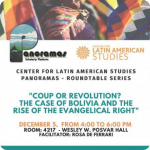
- 4217 Wesley W. Posvar Hall
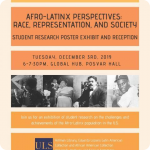
- Global Hub
This event showcases student research from the upper division undergraduate course, “Afro-Latinos in the U.S.” with Michele Reid-Vazquez, Africana Studies Department. The twenty-one participants will provide visual and textual iterations of the experiences of Afro-Latinxs in regional and transnational contexts. Based on a range of primary sources, including memoirs, historic newspapers, interviews, and social media, this exhibition will present a powerful narrative of the struggles and achievements of Afro-Latinxs. Examples include the racial acculturation of Cubans and Puerto Ricans who migrated in the early twentieth century; racism encountered by sports figures, such as Roberto Clemente (baseball) and Herbert Lewis Hardwick (boxing); Afro-Latinas’ resistance to colorism and sexism; the invisibility of Afro-Latinxs in media and film; and broader efforts to counter injustice and prejudice. https://www.planforpitt.pitt.edu/projects/afro-latin-american-and-afro-l...

- Global Hub
This event showcases student research from the upper division undergraduate course, “Afro-Latinos in the U.S.” with Michele Reid-Vazquez, Africana Studies Department. The twenty-one participants will provide visual and textual iterations of the experiences of Afro-Latinxs in regional and transnational contexts. Based on a range of primary sources, including memoirs, historic newspapers, interviews, and social media, this exhibition will present a powerful narrative of the struggles and achievements of Afro-Latinxs. Examples include the racial acculturation of Cubans and Puerto Ricans who migrated in the early twentieth century; racism encountered by sports figures, such as Roberto Clemente (baseball) and Herbert Lewis Hardwick (boxing); Afro-Latinas’ resistance to colorism and sexism; the invisibility of Afro-Latinxs in media and film; and broader efforts to counter injustice and prejudice. https://www.planforpitt.pitt.edu/projects/afro-latin-american-and-afro-l...
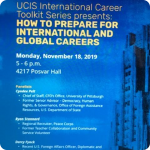
- Posvar Hall, Rm 4217
Recent government and nonprofit professionals will discuss their interest in, pursuit of, and perspective on international and global employment. Discussion Style workshop.
Panelists:
Cyndee Pelt
Chief of Staff, CFO’s Office, University of Pittsburgh
Former Senior Advisor – Democracy, Human Rights, & Governance, Office of Foreign Assistance Resources, U.S. Department of State
Ryan Stannard
Regional Recruiter, Peace Corps
Former Teacher Collaboration and Community Service Volunteer
Darcy Fyock
Recent U.S. Foreign Affairs Officer, Diplomatic and Consular Service, U.S. Department of State
Former Teacher, Northern Virginia School Districts
20 Spots Available. Please sign up below:
https://signup.com/go/CVJLVGy
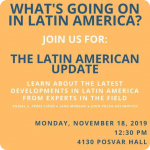
- A n í b al P é r e z - Li ñ a n, J a n a M o r g a n, J o h n P o l g a -H e c i m o v i c h
- 4130 Wesley W. Posvar Hall
Learn about the latest Development in Latin America from experts in the field.
For more information, email: clas@pitt.edu
Lunch will be provided.

- Waseem Mardini '08
- 4217 Posvar Hall Global Studies
Waseem Mardini is a 2008 graduate from the University of Pittsburgh. He then went on to obtain his Masters in International Affairs from Columbia University, studying subjects such as Human Rights, Humanitarianism, and Sustainable Development. He has worked in New York City and Washington, DC, working for groups such as the Foundation for Middle East Peace, Equitable Origin, and the Arab American Institute. He was the Policy Advisor at Publish What You Pay, where he focused on the corruption in the oil, gas and mining sectors. He also has worked on governance of extractive industries, transparency and accountability, international human rights law, and international corporate responsibility standards. Furthermore, Mr. Mardini has experience in researching human rights violations and conflict in the Middle East. Currently, he works as a Project Manager for KnowTheChain, an organization devoted to educating companies and investors about forced labor and what it means to be transparent and accountable.

- Pitt Global Hub
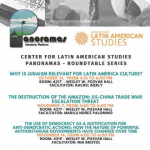
Lecture: Panoramas Round Table: The Destruction of the Amazon: USA-China Trade War Escalation Thread
- 4217 Wesley W. Posvar Hall

- Susan Douglass, K-14 Education Outreach Coordinator Center for Contemporary Arab Studies at Georgetown University
- 4130 Posvar Hall
In this workshop, participants will gain access to resources on teaching about cultural interactions as a topic of study. Using examples from the arts, technology and trade, we will explore primary sources that illustrate how to teach about these interactions through documents, objects, and artworks that represent modes of interaction. They will explore the story of classical knowledge and its transfer to Europe, as well as material culture such as foods and fabrics that moved across the eras to become global consumer products. Finally, we will discuss frameworks for teaching about the world that put the "global" into world history. Dinner, parking, and Act 48 credit are provided. Register at https://forms.gle/bcMEw8qbPMDTS5zi7.

- Pitt Global Hub
- ‹ previous
- 50 of 52
- next ›


